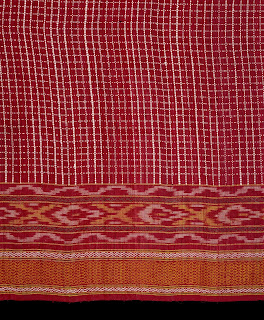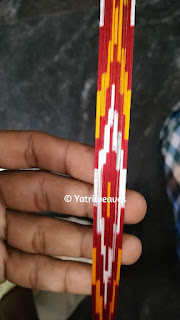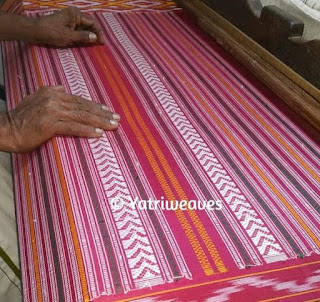Thanjavur Ikat Saree: A Timeless Piece of Indian Textile Art
Thanjavur Ikat Saree - From Victoria & Albert museum archives
Warp Ikat was rarely used in Tamil Saris
It was used to maximize the impact of a saree that would probably be worn in a wedding ceremony. It was also used a part of border decoration in quite simple area.
I remember seeing a saree in the Victoria and Albert museum archives that had 5inch warp Ikat borders and saved it to my gallery
 |
| The original saree from V&A archives |
This saree had mayilkan borders, rettai neli, three color Ikat pattern bounded by a wavy Ikat pattern. The body had muthukattam patterns woven all over the saree.
The Pallu however looked simple with few bands and arrow patterns.
After
finishing out first project on Kutni, Mr. Senthil and I were discussing
about Ikat borders on sarees and I remembered this this particular saree and shared the images with him
He was initially reluctant to try since
there were very less people who were doing the patterns. There was also one more concern regarding the patterns in pallu. We werent sure if it was weft Ikat for the arrows
 |
| Thanjavur Ikat Saree - A Close-up of borders |
The design had curves which means, tying one thread wrong would collapse in the design. Though it took us a while, Mr. Senthil did his best and achieved perfection of the ikat borders
 |
| Ikat Borders by Mr. Senthil |
The entire saree was woven using Adai method (Without the use of Jacquard machine) The original saree had a shorter pallu, we made it long keeping the same design and increasing their size.
 |
| Weaving the Pallu |
 |
| National Award Winning Master Weaver Selvaraj weaving the saree |
 |
| The Completed Sari |
From the archives we came to know that Forbes
Watson included this piece in his "Travelling Museum" of Indian textiles
as a woman's garment from Thanjavur.This type of saree is usually associated in South
India with temple rituals or weddings.
We also came to know that this saree was transferred from India Museum 1879. The original saree was 8 yards in length 1 yard 3 inches wide.
Later while going through Rosemary Crill's Ikat Textiles of India, we came to know that the original saree made approximately in 1855 fell victim in the late 19th Century to the Indian Museum policy of cutting up large textiles into fragments for study purposes
We did the same in two more colors. Purple (Both Brinjal and Deep Purple) and Green (Emerald)
 |
| Emerald Green |
 |
| Deep Purple |
thanjavur ikat saree, silk saree, cotton saree, indian textile art, ikat dyeing, wedding saree, festival saree, formal wear, everyday wear
Comments